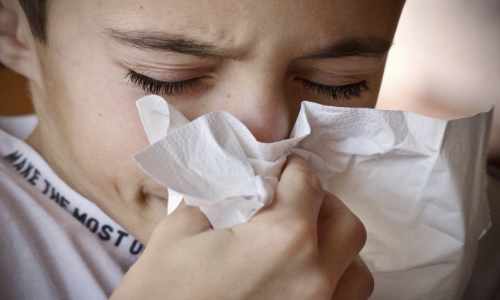OVERVIEW - CHRONIC COUGH AND COLD
SYMPTOMS OF CHRONIC COUGH AND COLD
Chronic cough and cold can manifest as persistent respiratory symptoms that endure for more than eight weeks. Identifying these symptoms is crucial for understanding the underlying cause and seeking appropriate medical attention. Here are common indicators:
Nagging Cough:
A cough that lingers for an extended period, often without a clear cause.
Dry or productive (with phlegm), persistent throughout the day or night.
Nasal Congestion:
Blockage or stuffiness in the nasal passages.
Difficulty breathing through the nose, often accompanied by a sensation of pressure.
Postnasal Drip:
Excessive mucus production leading to a constant drip down the throat.
Feeling the need to clear the throat frequently, especially after lying down.
Fatigue:
Persistent tiredness or lack of energy.
Feeling worn out despite adequate rest, possibly due to the body’s efforts to combat the underlying cause.
Sore Throat:
Discomfort or pain in the throat.
Irritation, scratchiness, or a raw feeling in the throat, often exacerbated by coughing.
Breathing Difficulties:
Challenges in breathing normally.
Shortness of breath, wheezing, or a feeling of tightness in the chest, particularly during physical activities.
Interrupted Sleep:
Difficulty maintaining a consistent sleep pattern.
Coughing fits or nasal congestion disrupting sleep, leading to fatigue and irritability.
Symptoms Worsening Over Time:
Gradual intensification of respiratory distress.
Symptoms persist or worsen despite attempts at self-care or over-the-counter remedies.
CAUSES OF CHRONIC COUGH AND COLD
Factors that contribute to chronic cough and cold reveals a myriad of influences, each playing a unique role in the persistence of respiratory symptoms. Let’s explore the detailed tapestry of these underlying causes:
Infections
Viral or bacterial invaders become catalysts for enduring respiratory distress.
The relentless presence of cough and cold symptoms, surpassing the typical duration of an acute infection.
Allergies
Sensitivity to allergens, such as pollen, dust, or pet dander, triggers an ongoing respiratory response.
Symptoms may ebb and flow, aligning with seasonal changes or persisting relentlessly throughout the year, contingent on the nature of the allergen.
Environmental Factors
The ambient surroundings, laden with air pollution, exposure to cigarette smoke, or workplace irritants, contribute to prolonged respiratory irritation.
Continuous exposure to pollutants results in persistent respiratory symptoms, a testament to the impact of the environment on our well-being.
Gastroesophageal Reflux Disease (GERD)
Stomach acid, ascending to the airways, acts as a persistent instigator of cough.
Coughing episodes intensify after meals, particularly when reclining, unveiling the intricate connection between gastric contents and respiratory distress.
Underlying Health Conditions
Chronic ailments like asthma or chronic obstructive pulmonary disease (COPD) manifest as enduring respiratory challenges.
Symptoms, either intermittent or constant, find exacerbation in response to specific triggers, shedding light on the intricate interplay between health conditions and respiratory well-being.
Postnasal Drip
Excessive mucus production becomes a perpetual source of throat irritation and cough.
The constant need to clear the throat, especially prominent after reclining, signifies the persistent influence of postnasal drip.
Sinusitis
Inflammation within the sinuses sets the stage for prolonged nasal congestion and respiratory discomfort.
Chronic nasal congestion, coupled with facial pain and the incessant drip of mucus, casts a spotlight on the enduring impact of sinus inflammation.
Medication Side Effects
Certain medications introduce persistent cough and cold symptoms as unwelcome companions.
The onset or alteration of specific medications correlates with the emergence of enduring respiratory challenges, highlighting the intricate dance between pharmaceutical interventions and their side effects.
Immunodeficiency Disorders
Weakened immune defenses pave the way for recurrent respiratory infections and prolonged convalescence.
Frequent bouts of illness and protracted recovery periods underscore the critical role of a robust immune system in respiratory health.
Environmental Irritants
Exposure to potent odors, pollutants, or chemicals becomes a continuous source of respiratory irritation.
A persistent cough and cold symptoms intensify within specific environments, unraveling the connection between external irritants and ongoing respiratory distress.
PREVENTION OF CHRONIC COUGH AND COLD
By following these simple steps, you can help your body stay strong and reduce the chances of getting a long-lasting cough or cold. Remember, taking care of yourself in simple ways goes a long way in keeping you healthy. If you ever feel unsure or sick, don’t hesitate to talk to a healthcare professional for guidance and care.
To steer clear of long-lasting coughs and colds, it’s important to take simple steps. Here’s an easy plan to keep your breathing in good shape:
Stay Active:
Move around regularly to keep your body and lungs strong.
Eat a mix of good foods with lots of vitamins to help your body stay strong.
Drink Enough Water:
Drink plenty of water to keep your throat from getting dry.
Be Mindful of Your Environment:
Try to stay away from places with lots of pollution, smoke, or things that might irritate your lungs.
Make sure your home and workspace are clean and have good airflow.
Wash Your Hands:
Wash your hands often to stop infections that can lead to coughs and colds.
Relax:
Find simple ways to relax, like deep breathing or doing activities you enjoy. Stress can make you more likely to get sick.
Avoid Things That Bother You:
If certain things make your nose or throat feel funny, try to avoid them. This might include things like pollen, dust, or pet hair.
Quit Smoking:
If you smoke, try to stop. Breathing in smoke, even from others, can make you sick.
Use Humidifiers:
If the air in your home is dry, use a humidifier. This helps keep your nose and throat from drying out.
Move Your Body:
Doing exercises that get your heart pumping is good for your lungs.
Get Vaccinated:
Make sure you get shots to protect against sicknesses like the flu or pneumonia.
Get Enough Sleep:
Make sure you get plenty of good sleep. It helps your body stay strong and fight off sickness.
Let Fresh Air In:
Make sure your home has fresh air. Open windows when you can to let in fresh air and get rid of stuff that might make you sick.
Cover Your Mouth:
When you cough or sneeze, cover your mouth and nose to stop germs from spreading.
Check with a Doctor:
Visit the doctor regularly to make sure everything is okay with your health.
DIAGNOSIS FOR CHRONIC COUGH AND COLD
Healthcare professionals use various methods to diagnose and understand the factors contributing to prolonged respiratory symptoms. Here’s an overview of the diagnostic journey: Accurate diagnosis is crucial for developing a targeted treatment plan tailored to your specific needs. If you’re experiencing persistent cough and cold symptoms, seeking prompt medical attention and collaborating with your healthcare team will guide you toward the most effective path to wellness.
Comprehensive Medical History:
Your healthcare provider will discuss your medical history, including the duration and pattern of your symptoms, past illnesses, and any relevant environmental or lifestyle factors.
Physical Examination:
A physical examination helps the healthcare professional assess your overall health and identify any visible signs or symptoms related to the respiratory system.
Allergy Testing:
If allergies are suspected, allergy testing may be recommended to identify specific allergens triggering your symptoms.
Imaging Studies:
X-rays or CT scans may be performed to visualize the lungs and assess for any abnormalities, such as infections, inflammation, or structural issues.
Pulmonary Function Tests:
These tests measure how well your lungs function. Spirometry, for example, assesses airflow and can help identify conditions like asthma or chronic obstructive pulmonary disease (COPD).
Blood Tests:
Blood tests may be conducted to check for signs of infection, allergies, or other systemic conditions that could contribute to persistent respiratory symptoms.
Cultures and Swabs:
If a bacterial infection is suspected, your healthcare provider may recommend cultures or swabs to identify the specific bacteria and guide antibiotic treatment if necessary.
Bronchoscopy:
In some cases, a bronchoscopy may be performed, where a thin, flexible tube with a camera is inserted into the airways to visualize the respiratory tract and collect samples for testing.
Reflux Monitoring:
For suspected gastroesophageal reflux disease (GERD), monitoring methods may be employed to assess the presence of stomach acid in the airways.
Environmental and Occupational Assessments:
Evaluating your living and working environments may help identify potential triggers, such as exposure to pollutants, irritants, or occupational hazards.
Consultation with Specialists:
Depending on the findings, your healthcare provider may involve specialists such as allergists, pulmonologists, or ear, nose, and throat (ENT) doctors to provide a comprehensive evaluation.
Response to Treatment:
Sometimes, a diagnostic approach involves observing how your symptoms respond to specific treatments. Improvement or lack thereof can offer valuable insights into the underlying cause.
ALLOPATHY APPROACH IN TREATING CHRONIC COUGH AND COLD
In traditional medicine, when you have a cough and cold that just won’t go away, doctors might use an allopathic approach. Here’s how they typically approach it:
Understanding the Cause:
Doctors will try to figure out why you have this cough and cold that lingers. They might ask about your health history, do physical exams, and sometimes use tests.
Medications to Relieve Symptoms:
If your symptoms are bothering you, doctors might suggest medicines to help. These can include cough syrup, decongestants, or pain relievers.
Antibiotics for Infections:
If there’s a bacterial infection causing your symptoms, doctors might prescribe antibiotics to fight the infection.
Inhalers for Breathing Issues:
If you’re having trouble breathing, especially if you have conditions like asthma, doctors might give you inhalers to help open up your airways.
Allergy Medications:
If allergies are part of the problem, doctors might recommend antihistamines or other allergy medications to ease your symptoms.
Follow-Up and Adjustments:
After starting a treatment, doctors will often check how you’re doing. They might adjust your medications or suggest other steps based on your progress.
Specialists if Needed:
If your symptoms are complex, doctors might involve specialists like pulmonologists (lung experts) or allergists to provide more targeted care.
AYURVEDA APPROACH IN TREATING CHRONIC COUGH AND COLD
Ayurveda views each person uniquely, and treatments are personalized based on individual constitution and imbalances. It’s advisable to consult with an Ayurvedic practitioner for a tailored approach to address chronic cough and cold symptoms. In Ayurveda, treating chronic cough and cold involves balancing your body’s energies, known as “doshas.” Here’s how Ayurveda approaches the healing process:
Identifying Dosha Imbalance:
Ayurveda believes that an imbalance in the doshas—Vata, Pitta, and Kapha—can contribute to chronic cough and cold. Understanding this helps tailor the treatment.
Personalized Dietary Changes:
Ayurvedic practitioners may suggest dietary adjustments based on your dosha. This could include warm and nourishing foods for Vata, cooling foods for Pitta, and light, warm foods for Kapha.
Herbal Remedies:
Ayurveda uses various herbs with specific properties to address respiratory issues. For example, ginger and turmeric are known for their anti-inflammatory effects.
Lifestyle Recommendations:
Ayurveda emphasizes lifestyle habits that support overall well-being. This may include maintaining a regular sleep schedule, staying hydrated, and incorporating gentle exercise like yoga.
Ayurvedic Massage (Abhyanga):
Abhyanga involves massaging the body with warm oil. This practice is believed to pacify Vata, reduce stress, and support the immune system.
Steam Inhalation (Nasya):
In Nasya, herbal oils or decoctions are used for nasal drops or steam inhalation. This can help clear the respiratory passages and alleviate congestion.
Balancing Energies (Prana Vayu):
Ayurveda focuses on balancing Prana Vayu, the vital energy responsible for respiratory health. Breathwork exercises, such as Pranayama, are often suggested.
Ayurvedic Teas and Decoctions:
Herbal teas and concoctions are common in Ayurveda. For cough and cold, teas with ingredients like tulsi, ginger, and honey may be recommended.
Mind-Body Connection:
Ayurveda recognizes the mind-body connection. Practices like meditation and mindfulness are encouraged to reduce stress, which can be a contributing factor to respiratory issues.
ROLE OF PANCHKARMA IN TREATING CHRONIC COUGH AND COLD
Panchkarma, with its holistic and individualized approach, offers a comprehensive strategy for treating chronic cough and cold. It not only targets the symptoms but also addresses the underlying imbalances, promoting long-term respiratory health.
If considering Panchkarma, it’s advisable to consult with a qualified Ayurvedic practitioner to determine the most suitable and effective treatment plan for your specific needs. Panchkarma, a therapeutic approach rooted in Ayurveda, plays a significant role in addressing chronic cough and cold.
Panchkarma is not a one-size-fits-all approach. The therapies are personalized based on the individual’s constitution, dosha imbalances, and specific health concerns, ensuring targeted and effective treatment. Here’s how it contributes to the healing process:
Balancing Doshas:
Panchkarma aims to restore balance to the doshas, particularly focusing on Vata, Pitta, and Kapha imbalances associated with respiratory issues.
Detoxification:
The therapies involved in Panchkarma facilitate the elimination of toxins from the body. This detoxification process is believed to enhance overall health and alleviate chronic respiratory symptoms.
Nasya Therapy:
Nasya, a specific Panchkarma therapy, involves administering herbal oils or decoctions through the nasal passages. This helps clear congestion, reduce inflammation, and promote respiratory well-being.
Vamana (Therapeutic Vomiting):
In certain cases, Vamana may be recommended to expel excess mucus and toxins from the respiratory system, providing relief from chronic cough and cold.
Swedana (Herbal Steam Therapy):
Swedana, a form of herbal steam therapy, helps open up the respiratory passages. This can be particularly beneficial in easing congestion and promoting easier breathing.
Abhyanga (Ayurvedic Massage):
Abhyanga, a key component of Panchkarma, involves therapeutic oil massages. This practice helps pacify Vata, reduce stress, and support the immune system, contributing to respiratory health.
Basti (Enema Therapy):
Depending on the individual’s condition, Basti may be recommended to cleanse and nourish the colon. This purification process is believed to have a positive impact on overall health, including respiratory well-being.
Purvakarma (Preparatory Procedures):
Before the main Panchkarma therapies, certain preparatory procedures are undertaken to prepare the body for the detoxification process. This ensures maximum effectiveness in addressing chronic cough and cold.
TREATMENT AT DR MONGA MEDI CLINIC
If you experience persistent symptoms of chronic cough and cold, especially if they interfere with your daily activities or impact your quality of life, it’s essential to consult with a healthcare professional like we have in our Clinics. They can conduct a thorough evaluation to determine the underlying cause and recommend an appropriate treatment plan.
By combining the strengths of allopathic medicine and Ayurveda, our integrated approach aims to address the root causes, alleviate symptoms, and enhance overall respiratory well-being. Coordination between our doctors and personalized treatment plans contribute to a holistic strategy for managing chronic cough and cold.
FREQUENTLY ASKED QUESTIONS
If you experience persistent coughing, nasal congestion, and other respiratory symptoms for an extended period, it may indicate chronic cough and cold. Consult with a healthcare professional for a thorough evaluation.
When supervised by healthcare professionals, integrating Ayurvedic herbal supplements with allopathic medications can be safe. However, it’s crucial to inform both practitioners about all treatments being undertaken.
Yes, stress can weaken the immune system and exacerbate respiratory symptoms. Mind-body practices, such as yoga and meditation, can be beneficial in managing stress.
Dietary recommendations may vary based on individual constitution (dosha). However, a balanced diet with warm, nourishing foods and adequate hydration is generally beneficial.
It’s crucial to inform both your allopathic and Ayurvedic practitioners about all medications you are taking. They can work together to ensure compatibility and make necessary adjustments.














